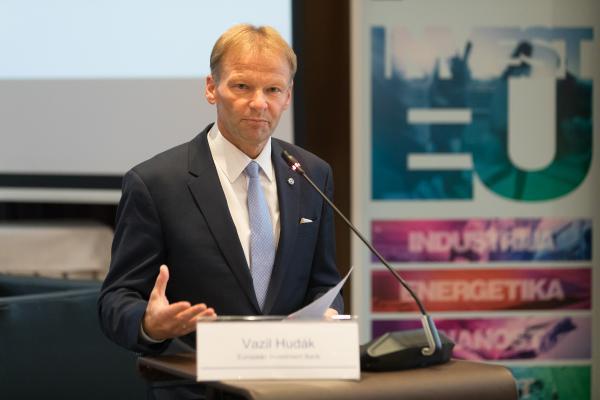
The European Investment Bank (EIB) is lending EUR 51m to Slovenia’s motorway company DARS to finance the introduction of an electronic tolling system for vehicles above 3.5t using the country’s motorway network. This is the EIB’s first direct transaction in Slovenia under the European Fund for Strategic Investments (EFSI) as part of the Investment Plan for Europe (Juncker Plan) backed by the EU budget portfolio guarantee. The loan was announced today to coincide with the Joint Investment Conference held in Ljubljana by the European Investment Bank, the European Commission and Bank of Slovenia, at which the EIB also presented the annual EIB Group Survey on Investment and Investment Finance (EIBIS) in Slovenia.
The DARS loan
The new tolling infrastructure that Slovenia’s motorway company DARS plans to introduce will replace physical barriers with free-flow, remote charging digital infrastructure on the entire Slovenian motorway network. Roads, including motorways, are the most important mode of transport in Slovenia accounting for 80% of inland transport. The new system uses microwave tags inside vehicles to record when they pass under microwave receivers mounted on overhead gantries on each section of a tolled road. Thanks to the upgrade, the existing physical toll stations will be dismantled, easing traffic flow.
This project represents a continuation of the EU bank’s fruitful cooperation with DARS. To date, the EIB has granted loans to this company amounting to some EUR 1.5bn, contributing significantly to the construction and maintenance of the country’s motorway network and fostering economic growth not just in Slovenia but also in its neighbouring countries.
The EIB loan will benefit from the EFSI guarantee and will possibly catalyse further financial support from the Slovenian National Promotional Bank (SID banka) as well as commercial banks.
EIB Group Survey on Investment and Investment Finance (EIBIS)
The main findings of the annual EIB Group Survey on Investment and Investment Finance (EIBIS) presented today at the Joint Investment Conference held by the EIB, the European Commission and Bank of Slovenia show that in Slovenia the recent economic downturn resulted in a sizeable investment gap, although the recovery of corporate investment has begun. According to the survey, Slovenia’s manufacturing sector is particularly dynamic in increasing its capital stock while capacity expansion is becoming an important investment objective for firms. In addition, while investment in general is dominated by the acquisition of physical equipment, the manufacturing sector has a strong focus on R&D too. The share of investment in support of R&D is close to the EU average and much higher than in other countries of the Central Europe and South-East Europe (CESEE) region.
According to the survey, in Slovenia four areas emerge as the main perceived barriers to investment: availability of more experienced staff (62%), labour market regulations (59%), business regulations (62%), and general uncertainty about the economic outlook (64%). Although skills shortage is among the principal barriers, Slovenian firms are still less likely to cite that as a constraint than the EU average (72%). As far as satisfaction with finance is concerned, only 8% of all firms in Slovenia are finance constrained, which is close to the EU average (7%), and a clear improvement compared to last year (11%).
EIB Vice-President Vazil Hudák commented: “The Bank is supporting innovation through the introduction of a new motorway tolling system, enabling a smoother and more ecological flow of transport on Slovenia’s motorways based on the “user pays” and “polluter pays” principles. This is facilitated by an EU budget guarantee provided under the Investment Plan for Europe aimed at reducing investment gaps – one of the main challenges for the EU economy.” He added: “At the same time, the EIB Group’s economic survey shows that, after some difficult years, Slovenia is enjoying solid economic growth, driven by domestic private consumption and renewed investment, which is particularly encouraging.”
EU Commissioner Violeta Bulc commented on the EFSI electronic tolling system project: "It is great news that on the day we have an important investment conference in Ljubljana, Slovenia receives its first financing for infrastructure under the Juncker Plan. Thanks to support from the European Fund for Strategic Investments, the Slovenian motorway company DARS will implement a modern electronic tolling system for heavy vehicles. This project will help to ease traffic flow in Slovenia which is good news for all travellers."
The CEO of DARS Tomaž Vidic stated: “Today we are demonstrating once again that our company is consistently among the first in Slovenia to follow EU development trends. This means obtaining considerable contributions from European funds, following innovative ways of financing or, in this case, benefiting from an EU budget portfolio guarantee. This shows that our long-lasting and solid cooperation with EIB has borne fruit today. Financing of EUR 51m has been provided for our most important project of the last few years – the new tolling system called DarsGo, which will become operational on 1 April 2018.”
The 2016 EIBIS survey is an EU-wide survey of 12 500 firms that gathers quantitative information on investment activities by both SMEs and larger corporates, their financing requirements and the difficulties they face. The results are weighted by value added, reflecting firms’ contribution to the economy. In Slovenia, the country overview presents selected findings based on telephone interviews with 400 firms.

Photographer: Simon ©Mad Pixel
Download original

Photographer: Simon ©Mad Pixel
Download original

Photographer: Simon ©Mad Pixel
Download original

Photographer: Simon ©Mad Pixel
Download original

Photographer: Simon ©Mad Pixel
Download original